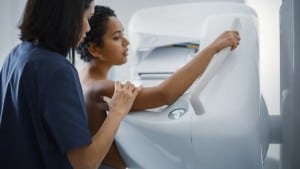Regional One Health’s Center for Innovation is partnering with Welwaze to test its Celbrea technology with physicians and patients in the health care system.
Celbrea is a quick, non-invasive and painless way to alert patients to seek further evaluation for breast cancer. It detects biothermal activity, which is a marker for breast disease, in just 15 minutes.
Catching cancer early is crucial to successful treatment and reducing the number of patients who die from breast cancer.
Regional One Health’s Center for Innovation works with disruptive thinkers in the health care industry to improve patient experiences and outcomes, and its latest partnership focuses on one of the most common concerns for women: breast health and breast cancer detection.
The innovation center is joining forces with Welwaze to evaluate its Celbrea technology, which offers a fast, non-invasive and painless way to sound an early alarm regarding breast disease.
“We are excited to work with Welwaze on its journey to save lives with its groundbreaking technology,” said Center for Innovation Director Alejandra Alvarez. “Our partnership makes it possible for us to offer the latest medical advances in breast disease detection to our patients.”
Celbrea is an FDA-cleared single-use disposable pad that monitors the surface temperature of the breast. It can detect biothermal activity, a marker for breast disease, in just 15 minutes, alerting a provider and patient to the need for additional screening and evaluation. It is used along with routine physical exams, breast palpation, mammography and other established procedures.

Center for Innovation Director Alejandra Alvarez said the partnership with Welwaze benefits patients: “One of the most exciting opportunities we have is to provide our patients first-hand access to state-of-the-art technology leading to directly improving the health of our community.”
At Regional One Health, providers will use Celbrea with two goals: to help Welwaze validate the effectiveness and performance of its technology, and to promote early detection for patients.
Providers will collect data each time the technology is used as part of a patient consultation. The data will provide valuable information Welwaze will use to evaluate Celbrea’s performance, guide future applications of the device, and identify other areas of research.
Meanwhile, patients gain another way to take charge of their breast health.
Breast cancer is the most common type of cancer among women worldwide, with a new patient diagnosed every minute and a patient dying every eight minutes. Early detection is the best way to reduce the number of deaths, since the disease is more treatable when caught early.
“We want to encourage women to seek medical attention as early as possible so they have the best chance to survive,” said Alex Ness, founder and CEO of Welwaze. “Our innovative technology helps women easily learn if there is any sign of breast disease so if the results show breast disease, they know how important it is to make an appointment with their physician.”
Celbrea can help women who face challenges with access to doctors and screening centers, as well as patients who need to monitor themselves more often because of their breast density or genetic profile. Ness added the technology can increase women’s compliance when it comes to keeping up their recommended mammogram schedule and can serve as a means of encouraging women to be more diligent about screening and seeing their doctor.

Celbrea helps patients know if they should seek follow-up screening for breast cancer. Catching breast cancer early makes treatment easier and gives patients their best chance at a positive outcome.
He said the collaboration with the Center for Innovation is extremely important to his company’s mission. “We have the opportunity to work directly with doctors and patients, which allows us to gather vital data that will validate the effectiveness of Celbrea and allow us to properly communicate these results to the medical community,” Ness explained.
Alvarez said that’s how the Center for Innovation is designed to work.
“We focus on empowering health care innovators to drive innovation that will improve patient experiences and outcomes locally, nationally and globally,” she said. “One of the most exciting opportunities we have is to provide our patients first-hand access to state-of-the-art technology leading to directly improving the health of our community.”
The Center for Innovation seeks to build a health care ecosystem of innovators and entrepreneurs by providing a platform that inspires, aligns and cultivate new ideas, research and technology.
They focus on three areas to help disrupt the health care industry:
- Building: Testing the viability, desirability and feasibility of promising ideas through their Innovation Lab.
- Partnering: Creating high-performing partnerships with experts in a variety of fields through the Healthcare Ecosystem Collaborative.
- Amplifying: Helping companies validate their business model or clinical use case through the Healthcare Startup Access Incubator.